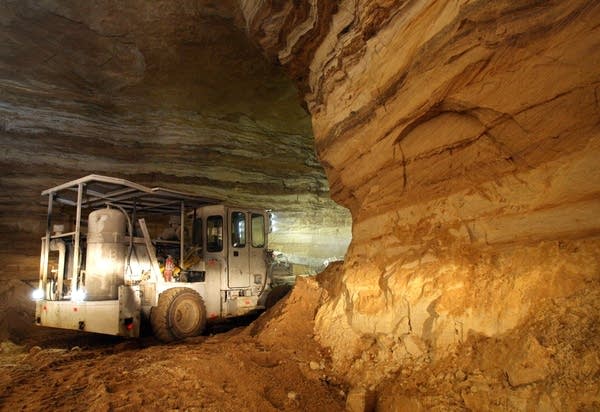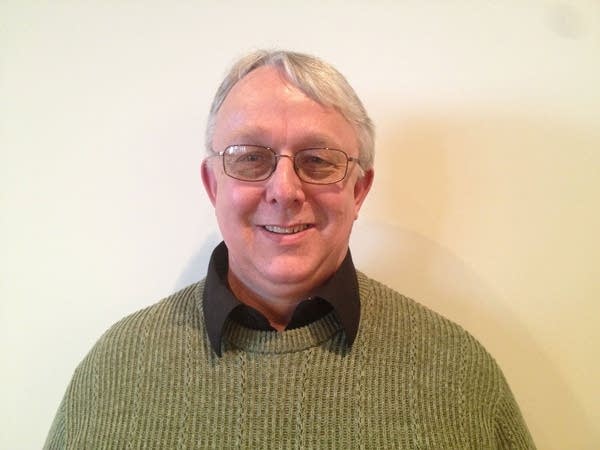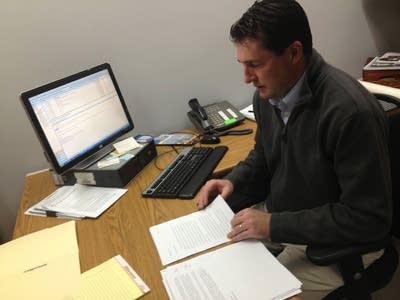Frac sand mining controversy moves to state Capitol

State lawmakers will hold hearings beginning this week to address the fast-growing frac sand industry and its effect on Minnesota.
Made of silica, the sand is used in hydraulic fracturing, or fracking, to extract natural gas and oil from the ground.
Although local lawmakers are grappling with how to zone and regulate the industry, rules differ widely throughout the state. Many local officials would welcome streamlined state regulations.
"I'm not a scientist and neither is anybody else here in the city," said Carlos Espinosa, an assistant city planner in Winona.
Create a More Connected Minnesota
MPR News is your trusted resource for the news you need. With your support, MPR News brings accessible, courageous journalism and authentic conversation to everyone - free of paywalls and barriers. Your gift makes a difference.
The southeastern Minnesota city is one of several in the state to temporarily ban sand mining expansion or new operations while officials put regulations in place. Winona's moratorium expires March 13.
Winona city officials have passed an ordinance that puts into place new requirements for silica sand mining operations. Those additions to the existing regulations require that silica mining facilities must be 1,000 feet away from residential districts, and any processing equipment and stockpiles must be 200 feet from a residential property.

The county ordinance also requires mining facilities to test sand to ensure it is moist enough to reduce air emissions and to conduct an analysis of potential disruptions to traffic for any facility that generates more than 200 truck trips per day.
Although the city's new ordinance is comprehensive, there are still health and environmental concerns that go beyond the city's ability to regulate.
"There are a lot of advantages to local control, local control of land use and local ordinances that we can put forward," Espinosa said. "But cities simply don't have the staff to handle air quality concerns. Cities typically don't deal with air quality. The scientists that have the expertise to create the standards that are needed are at the state level."
Espinosa is not alone in his concerns. From Red Wing and Wabasha to Preston and St. Charles, local officials say they have struggled to sort through frac sand mining issues that go beyond their city or county limits. Chief among them are the effects of mining on ambient air quality, water quality and regional transportation.
The industry has swept through the upper Midwest in recent years, including parts of southeastern Minnesota, and given rise to a loud opposition movement. According to the state Department of Natural Resources, there are eight active silica sand mines in the state.
Six mines are proposed near the Winona-Fillmore County line, and one mine application is currently on hold in Houston County.
One option state lawmakers are likely to consider this session is a statewide generic environmental impact statement. Winona and Red Wing have both passed resolutions requesting such a study. Officials say environmental recommendations from the DNR or Minnesota Pollution Control Agency officials would carry more weight with local residents on both sides of this controversial issue.

The issue is of such public concern that zoning officials at the Winona County Government Center have received hundreds of emails and letters on mining from residents.
Jason Gilman, the county's planning and environmental services director, said the level of public involvement and the divisiveness on mining, combined with the complexity of the environmental process, is part of the reason he supports having some state environmental and health rules.
"We've gotten a tremendous amount of emails and calls and organizations that wanted to meet with us," Gilman said. "And there are citizens on both sides of this issue. There are some that feel that this is a very important land use right that property owners have, and they have the ability to gain from the economics associated with the industry. And there are others, of course, that are very concerned about the impact of the industry, how big it will get and all the things that come along with it."
But not all local officials see state-level regulation the same way.
St. Charles Mayor Bill Spitzer is not sure yet whether a statewide environmental study or moratorium is necessary. But he said state agencies need some enhanced role in this process.
"The best thing the legislators could do... is to establish some best practices that we can use as guidelines," Spitzer said. "I think that's what the role of the state government should be at this point is to help us with the information that we need to make the decisions."

Winona Mayor Mark Peterson agreed. He said local governments need the state's help to weigh the industry's potential effect on the region as a whole.
"I don't want Winona's reputation to be tarnished as a place where you don't want to go to school or you don't want to live and raise your families," Peterson said. "That's very important."
The Senate Committee on Environment and Energy and House Committee on Energy Policy will hold a hearing at the state Capitol on Tuesday to consider testimony on the frac sand mining industry.
